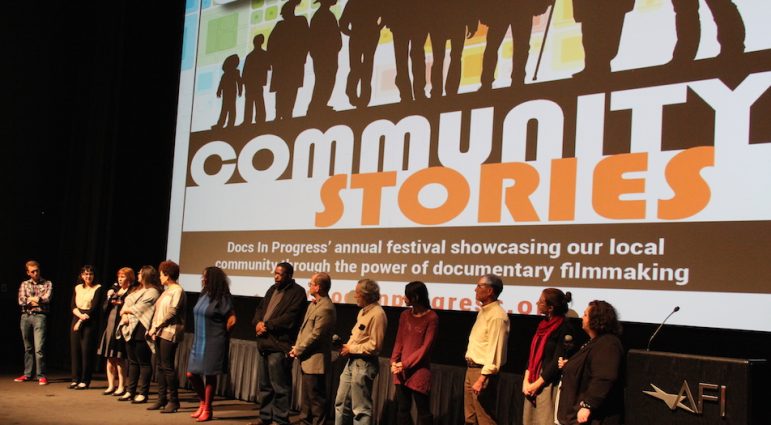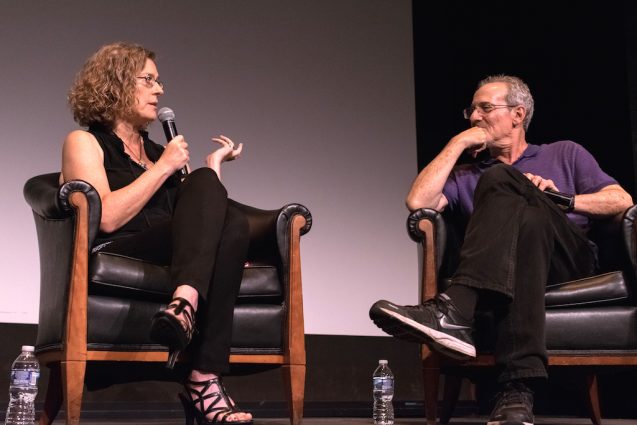Anyone who doubts that documentaries can capture the imagination as much as feature films needs only consider three hit movies of the season –“RBG,” about Supreme Court Justice Ruth Bader Ginsberg; “Won’t You Me My Neighbor?” about Fred Rogers and his television series; and “Three Identical Strangers,” about triplets forcibly separated at birth, then adopted by different families, as part of a social experiment.
Even if the movies they create never achieve the popular and critical acclaim of these three, many people dream of making them — especially documentaries. For locals whose ambitions lie in this direction, Docs In Progress can provide the tools. The nonprofit organization offers opportunities to learn about and create documentary films, including a youth summer camp, a filmmaking camp for people 55-plus, several educational workshops throughout the year and open screenings for novice documentary-makers so they may get feedback from the public and fellow filmmakers.
Docs In Progress sponsors the annual Community Stories Festival, which showcases documentaries about people and places in the local community. Initially, these films had to be made by the organizations adult education and youth camp students. Since 2015, Docs In Progress has expanded the festival to include more documentaries about local topics by other filmmakers.
The deadline for entries was Aug. 31, and this year’s festival will take place from Nov. 8 through14 at locations including the Docs In Progress headquarters, the Takoma Park Community Center and the Silver Spring Civic Center.

Docs In Progress was the brainchild of three individuals: Erica Ginsberg, now its executive director; Sam Hampton, who served on its founding staff for four years and continues as a teaching artist and consultant; and Adele Schmidt, a Rockville resident and teaching artist.
At the time, Ginsberg and Schmidt were independent filmmakers. “The organization has been around, in one way or another, for 14 years, but has been in downtown Silver Spring since 2008,” said Ginsberg.
Docs In Progress has many “graduates.” Among them is cultural anthropologist Sheila Walker. In 2009, she was a college faculty member, striving to make a documentary but not knowing where to start.
A neighbor’s daughter told Walker she “had to meet” Hampton, who was instrumental in developing Docs In Progress’ core curriculum of adult and youth educational programs and remains a key advisor, according to Ginsberg.
Walker signed up for three classes at Docs In Progress, becoming an “immediate junkie,” she said. “Before I was doing research, writing and giving lectures. Now I make documentaries.”
In one of those classes, on video-editing, Walker made a trailer about the African diaspora, her field of research. Most recently, she took a course on iPhone filmmaking.
Walker is particularly gratified that a short film she made ended up at the United Nations as part of its “Familiar Faces/Unexpected Places: A Global African Diaspora” exhibit. The film was a response, in part, to what a professor told Walker in college, that “African Americans had no culture and contributed nothing to society.”
Beyond teaching skills, the focus of Docs In Progress is “building community” through educational programs and public screenings. “We help people develop ideas into documentaries and use these as a form of artistic expression. We’re like a hybrid between an arts organization and a community center,” Ginsberg said.
Before Docs In Progress came into existence, said Schmidt, filmmakers were working on movies “in isolation,” whereas filmmaking is all about community and working together. “It’s difficult to come up with movies without [community],” she explained.
Thus, Ginsberg said, the organization set about to bring together groups of like-minded people who could create films together.
Docs In Progress is like a consulting service for people who didn’t go to university for a filmmaking degree or already have another degree and can’t or don’t want to study film later in life, said Schmidt, who has her own production company. “We’re like a support network for the community — no matter where a person is in the process or where you’re coming from.”
In her own search for creative expression, Ginsberg went to film school, aspiring to become a screenwriter. But while at school, she developed a love of the genre and started working on making films.

Docs In Progress gets a boost from the fact that the metropolitan area contains a “really huge community of filmmakers,” she said. “Many of these people had a similar story. They were passionate about a topic and wanted to make a film.”
Reemberto Rodriguez, director of the Silver Spring Regional Center, who has been familiar with Docs In Progress since its inception, considers it “our community’s primary storyteller. They are the only organization that logs in those stories (via their YouTube channel) for all to see and learn from,” he said.
The key to creating a documentary, or anything else, is “finding one’s voice,” Schmidt said. “People have ideas and want to be creative. It’s very important for the mind and happiness.”
Workshop fees are relatively low, ranging from $25 to $250.
“We also offer train-the-trainer workshops and consultancies with schools and youth-serving nonprofits,” said Andrea Passafiume, Docs In Progress’ educational programs manager. In 2018, the nonprofit partnered with the City of Takoma Park to hold youth documentary filmmaking camps at the Takoma Park Community Center.
That three of the season’s most-popular films this summer are documentaries is no accident, Passafiume said. “For the past two decades, it’s been the time of documentaries. We [no longer] feel they’re like spinach, given to someone because it’s good for you, and that it has to be depressing or boring.”
There are many kinds of documentaries: some are personal; some relate to social issues. They may be narrative or nonfiction, Passafiume pointed out.
“We can really push the form. What makes a good documentary is what makes other kinds of artistic good forms. Good documentaries are about good stories,” said Passafiume.
It also helps that the number of platforms that show documentaries is growing — such as Netflix, film festivals at Tribeca in New York City and AFI/Silver Spring. Even TCM (The Movie Channel), which usually shows feature films, sometimes veers into documentaries.
Docs In Progress is located at 801 Wayne Avenue, Suite G-100, Silver Spring. For information, call 301-789-2797 or visit www.docsinprogress.org.